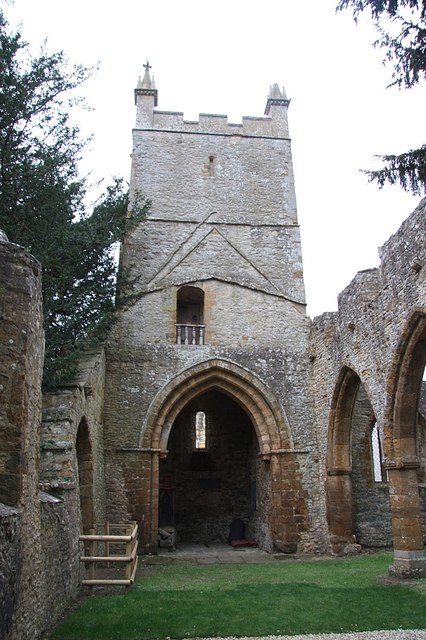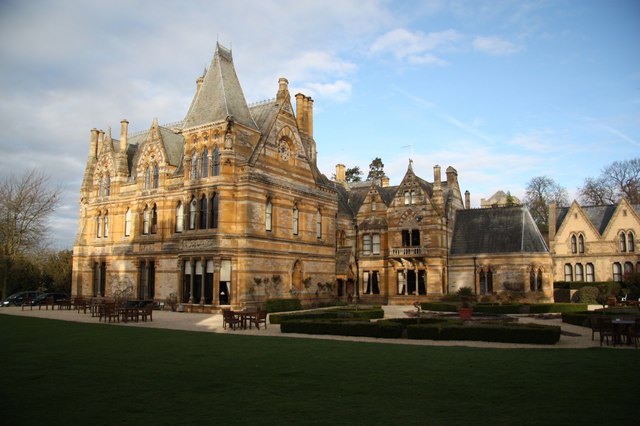|
Ettington Park Hotel
Ettington Park, Ettington, Warwickshire, England is a 19th-century country house with earlier origins. The historic home of the Shirley family, whose ownership dates from the time of the Domesday Book, the house was remodelled between 1858 and 1862 for Evelyn Shirley. Shirley's architect was John Prichard, although the involvement of Prichard's long-time partner John Pollard Seddon is disputed. The Grade I listed building, described by Chris Pickford and Nikolaus Pevsner as "the most important and impressive High Victorian house in the county", is now a hotel. History The site was occupied by a manor house for several centuries before the construction of the current building. Before the reign of Henry III, the nearby estate of Lower Ettington was the principal seat of the Ferrers family, who later moved their seat to Shirley, Derbyshire. In earlier centuries, the grounds were a deerpark. According to Alice Dryden: Sir Ralph Shirley leased the manor in 1509 to John and ... [...More Info...] [...Related Items...] OR: [Wikipedia] [Google] [Baidu] |
Ettington
Ettington is a village and civil parish about south-east of Stratford-upon-Avon in Warwickshire, England. The 2011 Census recorded the parish's population as 1,171. The present village is on the A422 main road linking Stratford and Banbury. The A429 main road linking Warwick and Cirencester used to run through the village, and now uses a bypass just west of it. The Fosse Way Roman road (B4455 road) crosses the A422 east of the village. Toponym The toponym "Ettington" is derived from the Old English words ''ea'' for water and ''don'' for ascending ground or meadow. The name has evolved through several forms including ''Eatenden'' and ''Eatington''. The latter is still used sometimes by locals. There used to be a Lower and Upper Ettington. Lower Ettington was beside the River Stour but was demolished in the 18th century. The present village is what used to be called Upper Ettington, and is on higher ground about to the northeast. Manors The Domesday Book of 1086 records tw ... [...More Info...] [...Related Items...] OR: [Wikipedia] [Google] [Baidu] |
Pevsner Architectural Guides
The Pevsner Architectural Guides are a series of guide books to the architecture of Great Britain and Ireland. Begun in the 1940s by the art historian Sir Nikolaus Pevsner, the 46 volumes of the original Buildings of England series were published between 1951 and 1974. The series was then extended to Scotland, Wales and Ireland in the late 1970s. Most of the English volumes have had subsequent revised and expanded editions, chiefly by other authors. The final Scottish volume, ''Lanarkshire and Renfrewshire'', was published in autumn 2016. This completed the series' coverage of Great Britain, in the 65th anniversary year of its inception. The Irish series remains incomplete. Origin and research methods After moving to the United Kingdom from his native Germany as a refugee in the 1930s, Nikolaus Pevsner found that the study of architectural history had little status in academic circles, and that the amount of information available, especially to travellers wanting to inform themse ... [...More Info...] [...Related Items...] OR: [Wikipedia] [Google] [Baidu] |
Grade I Listed Houses
Grade most commonly refers to: * Grade (education), a measurement of a student's performance * Grade, the number of the year a student has reached in a given educational stage * Grade (slope), the steepness of a slope Grade or grading may also refer to: Music * Grade (music), a formally assessed level of profiency in a musical instrument * Grade (band), punk rock band * Grades (producer), British electronic dance music producer and DJ Science and technology Biology and medicine * Grading (tumors), a measure of the aggressiveness of a tumor in medicine * The Grading of Recommendations Assessment, Development and Evaluation (GRADE) approach * Evolutionary grade, a paraphyletic group of organisms Geology * Graded bedding, a description of the variation in grain size through a bed in a sedimentary rock * Metamorphic grade, an indicatation of the degree of metamorphism of rocks * Ore grade, a measure that describes the concentration of a valuable natural material in the su ... [...More Info...] [...Related Items...] OR: [Wikipedia] [Google] [Baidu] |
Grade I Listed Buildings In Warwickshire
There are over 9,000 Grade I listed buildings in England. This page is a list of these buildings in the county of Warwickshire, by district. North Warwickshire Nuneaton and Bedworth Rugby Stratford-on-Avon Warwick See also * Grade II* listed buildings in Warwickshire Notes ReferencesNational Heritage List for England External links {{GradeIListedbuilding |
Gothic Revival Architecture In Warwickshire
Gothic or Gothics may refer to: People and languages *Goths or Gothic people, the ethnonym of a group of East Germanic tribes **Gothic language, an extinct East Germanic language spoken by the Goths **Crimean Gothic, the Gothic language spoken by the Crimean Goths, also extinct **Gothic alphabet, one of the alphabets used to write the Gothic language ** Gothic (Unicode block), a collection of Unicode characters of the Gothic alphabet Art and architecture *Gothic art, a Medieval art movement *Gothic architecture *Gothic Revival architecture (Neo-Gothic) **Carpenter Gothic **Collegiate Gothic **High Victorian Gothic Romanticism *Gothic fiction or Gothic Romanticism, a literary genre Entertainment * ''Gothic'' (film), a 1986 film by Ken Russell * ''Gothic'' (series), a video game series originally developed by Piranha Bytes Game Studios ** ''Gothic'' (video game), a 2001 video game developed by Piranha Bytes Game Studios Modern culture and lifestyle * Goth subculture, a music-cul ... [...More Info...] [...Related Items...] OR: [Wikipedia] [Google] [Baidu] |
Hotels In Warwickshire
A hotel is an establishment that provides paid lodging on a short-term basis. Facilities provided inside a hotel room may range from a modest-quality mattress in a small room to large suites with bigger, higher-quality beds, a dresser, a refrigerator and other kitchen facilities, upholstered chairs, a flat screen television, and en-suite bathrooms. Small, lower-priced hotels may offer only the most basic guest services and facilities. Larger, higher-priced hotels may provide additional guest facilities such as a swimming pool, business centre (with computers, printers, and other office equipment), childcare, conference and event facilities, tennis or basketball courts, gymnasium, restaurants, day spa, and social function services. Hotel rooms are usually numbered (or named in some smaller hotels and B&Bs) to allow guests to identify their room. Some boutique, high-end hotels have custom decorated rooms. Some hotels offer meals as part of a room and board arrangement. In Ja ... [...More Info...] [...Related Items...] OR: [Wikipedia] [Google] [Baidu] |
Country Houses In Warwickshire
A country is a distinct part of the world, such as a state, nation, or other political entity. It may be a sovereign state or make up one part of a larger state. For example, the country of Japan is an independent, sovereign state, while the country of Wales is a component of a multi-part sovereign state, the United Kingdom. A country may be a historically sovereign area (such as Korea), a currently sovereign territory with a unified government (such as Senegal), or a non-sovereign geographic region associated with certain distinct political, ethnic, or cultural characteristics (such as the Basque Country). The definition and usage of the word "country" is flexible and has changed over time. ''The Economist'' wrote in 2010 that "any attempt to find a clear definition of a country soon runs into a thicket of exceptions and anomalies." Most sovereign states, but not all countries, are members of the United Nations. The largest country by area is Russia, while the smallest i ... [...More Info...] [...Related Items...] OR: [Wikipedia] [Google] [Baidu] |
Cambridge University Press
Cambridge University Press is the university press of the University of Cambridge. Granted letters patent by Henry VIII of England, King Henry VIII in 1534, it is the oldest university press in the world. It is also the King's Printer. Cambridge University Press is a department of the University of Cambridge and is both an academic and educational publisher. It became part of Cambridge University Press & Assessment, following a merger with Cambridge Assessment in 2021. With a global sales presence, publishing hubs, and offices in more than 40 Country, countries, it publishes over 50,000 titles by authors from over 100 countries. Its publishing includes more than 380 academic journals, monographs, reference works, school and university textbooks, and English language teaching and learning publications. It also publishes Bibles, runs a bookshop in Cambridge, sells through Amazon, and has a conference venues business in Cambridge at the Pitt Building and the Sir Geoffrey Cass Spo ... [...More Info...] [...Related Items...] OR: [Wikipedia] [Google] [Baidu] |
The Watcher In The Woods (1980 Film)
''The Watcher in the Woods'' is a 1980 American supernatural horror film directed by John Hough and Vincent McEveety and starring Bette Davis, Carroll Baker, Lynn-Holly Johnson, Kyle Richards, and David McCallum. Based on the 1976 novel by Florence Engel Randall, the film tells the story of a teenage girl and her little sister who become encompassed in a supernatural mystery regarding a missing girl in the woods surrounding their new home in the English countryside. Filmed at Pinewood Studios and the surrounding areas in Buckinghamshire, England, ''The Watcher in the Woods'' was one of several live-action films produced by Walt Disney Productions in the 1980s, when the studio was targeting young adult audiences. The film had its premiere at the Ziegfeld Theatre in New York City on April 17, 1980, but was pulled from release after ten days, and future screenings were canceled by the studio because of an overwhelming negative response from critics and audiences. Several change ... [...More Info...] [...Related Items...] OR: [Wikipedia] [Google] [Baidu] |
The Haunting (1963 Film)
''The Haunting'' is a 1963 horror film directed and produced by Robert Wise, adapted by Nelson Gidding from Shirley Jackson's 1959 novel ''The Haunting of Hill House''. It stars Julie Harris, Claire Bloom, Richard Johnson, and Russ Tamblyn. The film depicts the experiences of a small group of people invited by a paranormal investigator to investigate a purportedly haunted house. Screenwriter Gidding, who had worked with director Wise on the 1958 film ''I Want to Live!'', began a six-month write of the script after reading the book, which Wise had given to him. He perceived the book to be more about mental breakdown than ghosts, and although he was informed after meeting author Shirley Jackson that it was very much a supernatural novel, elements of mental breakdown were introduced into the film. The film was shot at the MGM-British Studios near London, UK on a budget of US$1.05 million, with exteriors and the grounds shot at Ettington Park (now the Ettington Park Hotel) in th ... [...More Info...] [...Related Items...] OR: [Wikipedia] [Google] [Baidu] |
John Ruskin
John Ruskin (8 February 1819 20 January 1900) was an English writer, philosopher, art critic and polymath of the Victorian era. He wrote on subjects as varied as geology, architecture, myth, ornithology, literature, education, botany and political economy. Ruskin's writing styles and literary forms were equally varied. He wrote essays and treatises, poetry and lectures, travel guides and manuals, letters and even a fairy tale. He also made detailed sketches and paintings of rocks, plants, birds, landscapes, architectural structures and ornamentation. The elaborate style that characterised his earliest writing on art gave way in time to plainer language designed to communicate his ideas more effectively. In all of his writing, he emphasised the connections between nature, art and society. Ruskin was hugely influential in the latter half of the 19th century and up to the First World War. After a period of relative decline, his reputation has steadily improved since the 196 ... [...More Info...] [...Related Items...] OR: [Wikipedia] [Google] [Baidu] |






